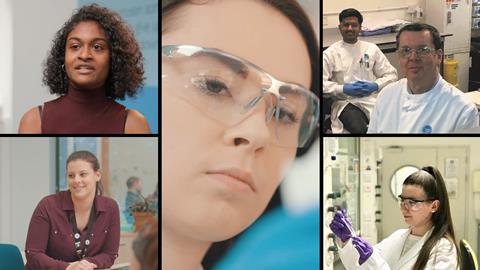Analytical chemistry is vital for industry and for providing possibilities for scientific discovery. Analytical chemists measure chemicals in substances, from medicines to crops, often to ensure safety.
At a glance
- What analytical chemists do: Analytical chemists identify chemicals and their amounts using scientific instrumentation, analytical techniques and data analysis. They find out what things contain – from testing our food, cosmetics, water and medicines to ensure there’s nothing harmful in them, to analysing air, soil or water samples to identify pollutants and protect the environment.
- Where analytical chemists work: Analytical chemists work in a huge variety of different settings such as hospitals, places that solve crimes (forensic labs) and companies that make chemical products such as cleaning chemicals, agrochemicals, cosmetics or paints.
- Routes into becoming an analytical chemist: Typically, a bachelor’s degree is required to enter a role as an analytical chemist. Find out more about different Higher Education options.
Read on to find out more or explore analytical chemists’ job profiles below.
What analytical chemists do
Analytical chemists play an essential role in safeguarding public health and the environment by ensuring the highest possible quality and safety standards are maintained across industries, providing vital scientific services across different sectors.
Analytical chemists are experts at using scientific instrumentation, analytical techniques and data analysis to solve problems and decipher the chemical makeup of the substances they are investigating. They also develop methods to accurately analyse and quantify individual substances in a mixture, then apply these methods to monitor the safety and effectiveness of key components in products – for example, in medicines, pesticides and disinfectants. This ensures the key components work throughout their lifespan without breaking down into toxic compounds.
As well as taking measurements using established methods, analytical chemists enhance our analytical capabilities, providing possibilities for scientific discovery.
Analytical chemists’ work normally involves:
- Analytical testing. Analytical chemists carry out practical work, following quality, health and safety procedures at all times. They prepare and test samples using scientific equipment and analytical techniques such as nuclear magnetic resonance spectroscopy, infrared spectroscopy, mass spectrometry and chromatography.
- Data analysis and interpretation. Analysing data is an integral part of being an analytical chemist. Analytical chemists will need to analyse and interpret their data using the most appropriate statistical methods and technology, which will involve keen attention to detail and mathematical skills. The types of data analytical chemists analyse is highly varied as it will depend on the sector they work within and what they are investigating.
- Report writing. Analytical chemists will need to record their data, capture their results and present their conclusions in a report. This will involve strong written communication skills.
- Problem solving. Analytical chemists may be presented with an unknown sample and would have to apply their knowledge of analytical techniques to work out how to test the sample and identify the components. Analytical chemists will also need to identify any issues and put processes in place to make improvements.
- Communication. Analytical chemists carry out independent work and work within a team, which will require communication skills. Analytical chemists might also need to communicate with people outside of their company as well as within. They might need to explain scientific concepts to audiences who do not necessarily have a background in science.
Where analytical chemists work
Chemical analysis is applied across many sectors so there is wide scope for analytical chemists to be employed across a range of fields. Here are some examples of where analytical chemists may work:
- Agricultural companies. Analytical chemists may test the quality of crop, soil and water samples, helping to improve the safety, sustainability and efficiency of agricultural practices.
- Chemical manufacturing companies. Analytical chemists play a vital role in ensuring that the day-to-day chemicals we use meet the highest safety and quality standards.
- Environmental companies. Analytical chemists monitor the environment by testing air, water and soil samples for contaminants.
- Food and water companies. Analytical chemists help to protect public health by testing our food and water samples for impurities, ensuring they meet safety standards.
- Forensic laboratories. Analytical chemists may examine biological and physical evidence, providing high-quality, scientific data that will inform crime investigation.
- Hospital laboratories. Analytical chemists may analyse biological samples such as blood and urine to help doctors to identify, diagnose and treat diseases.
- Pharmaceutical and biotechnology companies. Analytical chemists are essential in the development of high-quality, safe, effective medicines.
- Research and Development organisations. Analytical chemists contribute towards scientific advancements, using their analytical skills and techniques to test and improve new products and methods.
- Universities. Analytical chemists might conduct their own research to investigate new ideas for chemical measurement and teach students about chemistry.
Routes into becoming an analytical chemist
Typically, a bachelor’s degree (BSc) will be required to enter a role as an analytical chemist, either in chemistry or a related science subject. A master’s degree or PhD are not essential for entering this role but might help with entry into research roles. Find out more about going to university and what to consider.
Browse our table of Higher Education qualifications to explore different qualification levels and where they might lead.
-
HE qualifications
pdf, size 878 kb
Real-life stories from real-life analytical chemists

- Tilly researches human breath samples to potentially diagnose conditions like asthma
- Harsh and Michael analyse samples to keep the region’s water and sewage systems safe and operational.
- Claire stress tests new medicines in various stages of drug development
- James helps protect the environment by assessing the risks to life from dangerous chemicals in soil, water and air
- Erin helps turn new medicines into finished products to be mass-produced for patients
- Taryn uses scientific instruments to test our food and medicines and make sure they are safe













